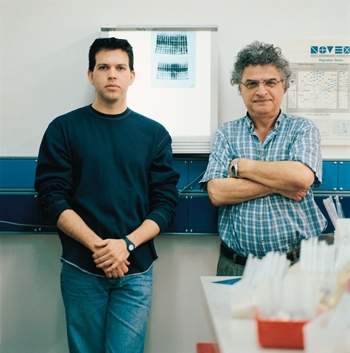Are you a journalist? Please sign up here for our press releases
Subscribe to our monthly newsletter:

Wise people learn from the experience of others, but such wisdom is rare. Most of us learn only from our own successes... and failures (which of course is why the irksome 'I told you so' will most likely never gather dust).
But how does such learning take place? How does the brain store new knowledge or readjust the old to reflect the current reality? Prof. Yadin Dudai and graduate student Diego Berman of the Weizmann Institute's Neurobiology Department have zeroed in on one of the underlying mechanisms. Their findings were recently published in Science.
Let's assume you try a certain delicious-looking dish and discover that it doesn't agree with you. Chances are you'll refuse it next time around. Your brain stores information that associates this dish with something unpleasant. A future encounter will trigger the 'retrieval' of this associative information, essentially a warning that your best recourse is a polite decline. This, of course, is what happens if you're wise enough to learn from experience.
But it's also wise not to hold on to the same opinions forever without reevaluation. In the case of the dish, the following turn of events is possible: somebody you like or trust persuades you to try it again, and much to your surprise you discover that it tastes great and doesn't disagree with you. This being the case, you're less likely to turn it down in the future. And if things go well again, your opinion about this dish, based on your more recent experiences, will change entirely. The old, negative association will no longer spring to mind. In fact, the opposite will occur - every time you see this dish, you'll remember how wonderful it tastes, forgetting that in the distant past it rubbed you the wrong way. In technical language this updating process is called 'extinction' - the brain has erased the old information and 'filed' new data reflecting your latest experiences.
How does this extinction process occur? Dudai and Berman discovered that the same brain regions gear into action whether we're learning new facts of life or updating old information. But in information-update - in other words, in relearning something - the brain does not make use of the entire learning machinery, only a few 'core' mechanisms are involved.
Learning is a complex, multistep, and multiplayer process, orchestrated with great precision. When we learn something for the first time, all components pitch in: a type of signaling enzyme, called MAPK, and receptors for glutamate, acetylcholine, and norepinephrine - all key neurotransmitters. Protein synthesis inside neuronal cells must also be efficient.
These efforts, however, are trimmed down when it comes to reevaluating and updating existing knowledge. The scientists found that only two elements - beta-adrenergic norepinephrine receptors and protein synthesis in brain nerve cells - are involved. Operating independently of all the others, these 'core' learning components are crucial for both first-time learning and memory extinction.
'These findings emphasize the brain's evolutionary efficiency,' says Dudai. 'The same mechanism is capable of working in different ways, at different levels.' Future applications of these and other research findings may make it possible to chemically control the way we update information according to experience. Of course, we'll probably still be hard put to explain why, if information updating is so efficient, so many people are entirely mulish when it comes to changing their mind.
Prof. Dudai holds the Sara and Michael Sela Professorial Chair of Neurobiology. His research is supported by the Abe and Kathryn Selsky Foundation, North Bethesda, MD; the Nella and Leon Benoziyo Center for Neurosciences; the Lester Crown Brain Research Fun; the Abramson Family Brain Research Program; and the Carl and Michaela Einhorn-Dominic Brain Research Institute.